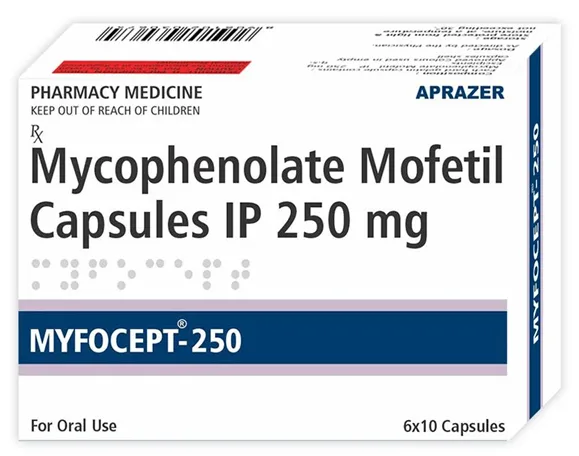Mycophenolate Mofetil Capsule
Mycophenolate Mofetil Capsule
Classification: Transplant Medicines
Mycophenolate Mofetil Capsule?
Mycophenolate Mofetil is used widely to reduce the body’s immune functions. It is also called anti-rejection medicine. It lowers the rejection of the new organ or graft planted inside the body.
It is used for organ transplant treatments and autoimmune disease.
Mycophenolate Mofetil Uses
- • It is used in the prophylaxis of Organ transplant treatment.
- • It is used to prevent organ rejection after a transplant surgery.
- • It is used to suppress the immune system in autoimmune disease.
What is Myfocept -250mg?
Myfocept 250mg is widely prescribed as a strong immunosuppressant to prevent organ rejection in organ transplant surgeries. Myfocept 250 mg, available worldwide, is strongly recommended in Nephrology care, liver care during kidney transplant, and liver transplant.
Myfocept 250 mg offers long-term graft protection and reduces the organ rejection episodes.
Aprazer Healthcare – The Trusted Organ Transplant Medicines
Aprazer Healthcare is the top Nephrology medicine manufacturer. We manufacture a range of affordable transplant medicines. We are the leading exporters of kidney care medicines and immunosuppressants.
Aprazer Healthcare is trusted worldwide, manufacturing premium quality immunosuppressants and the widest generic range.
Our product portfolio consists of top-quality Mycophenolate and Tacrolimus formulations.
Working of Mycophenolate Mofetil
Mycophenolate Mofetil inhibits the immune cell activity in the body, which increases the acceptance of a foreign organ in the body.
Mycophenolate Mofetil Common Side-Effects
The common side effects caused by mycophenolate Mofetil include primarily stomach upset or a lowering of the blood count.
- • Diarrhea
- • Nausea
- • Vomiting
- • Abdominal pain
- • Constipation
- • Anemia
- • Reduces the white blood cell count
- • Opportunistic infection
- • Increases the risk of secondary cancers
- • Headache
- • Dizziness
- • High blood pressure
- • Tremors
Mycophenolate Mofetil Serious Side Effects
Mycophenolate lowers the body’s ability to fight infection, increasing the risk of severe infection. It reduces platelets, blood cell coagulation, increasing the risk of bleeding.
- • Sepsis
- • Viral infection in the brain
- • Hepatitis B and C reactivation
- • Fungal infections
- • Bleeding
- • Blood in stool
Precautions for using Mycophenolate Mofetil
It should be used cautiously in various medical conditions that affect blood formation and immune cells.
Direct sun exposure may cause certain skin side effects.
It has to be used cautiously in people with:
- • Bone marrow suppression
- • Liver or kidney disorders
- • Gastrointestinal infections
- • Cancer
- • Weak immune systems
Warning for using Mycophenolate
- • It should not be used in pregnant women.
- • It should not be used in women, feeding infants, or children.
- • It should be used upon a doctor’s advice.
- • Live vaccines should not be given during therapy.
- • It can cause hypersensitivity.
Monitoring Considerations
The long-term use of Mycophenolate Mofetil requires regular monitoring to lower the dose in the event of side effects.
It should be carefully checked and regularly monitored for:
- • Total blood count
- • Signs of infection
- • Liver and kidney functions
Drug Interactions
Mycophenolate Mofetil causes various drug interactions. Therapeutic dose monitoring is required to reduce side effects.
It should be used cautiously with various drugs:
- • Antacids
- • Rifampicin, Macrolides
- • Other Immunosuppressants
- • Live Vaccines
Important Note
Mycophenolate mofetil strongly lowers the body’s immune system and increases the risk of severe infections. The long–term therapy should be carefully monitored for signs of infections, risk of bleeding.

